Breaking Barriers: Reyna Guzmán Casarez and the Birth of the Parade of Allegorical Cars
BY DAISY MURGUIA EDITED BY SILVIA FERRER ON SEPTEMBER 8, 2023
Reyna Guzmán Casarez holding the Mexican flag. (Screenshot of short video directed by Hector Tapia, produced by Tigre Media)
Reyna Casarez is the host of the Philatinos Radio show “Talento y Comunidad” (Photo: courtesy of Reyna Casarez)
The first thing you notice when looking at Reyna Guzmán Casarez is her warm smile, followed by her eyeglasses and dangling earrings. Behind her is a Mexican flag, representative of her pride in being a Mexican woman in Philadelphia. Guzmán Casarez is a community leader, radio host at Philatinos Radio, and a multidisciplinary artist. She spent years thinking about creating a cultural event that would celebrate her Mexican roots with the Latine community in Philadelphia — in 2022, she made her dreams come true with the creation of the “Desfile de Carros Alegoricos,” or Parade of Allegorical Cars.
“Last year marked 15 years since I’ve been in Philadelphia and I said this initiative came to stay, all are welcome, and everyone has the opportunity to feel part of the same piece,” said Guzmán Casarez.
Before dedicating herself to planning the event, Guzmán Casarez filled her time working as the host of her radio show and as a domestic worker. When her voice didn’t travel through radio airwaves, it was used in support of the National Domestic Workers Alliance, or to speak with her family. To support herself, Reyna has also worked in the restaurant industry, but her passion for the arts comes from her childhood, She is also an artisan and has been embroidering since she was a child.
Reyna Casarez. at the Parade in Mexico when she was in high school. (Courtesy of Reyna Casarez)
Cultural traditions and memories from her homeland
Guzmán Casarez has created a life full of love and community for herself in the United States, but it was her happy memories of her birth country, Mexico, that convinced her to put into motion the first Parade of Allegorical Cars. “I arrived here at 23 years old, I am now 39, half my life has been here,” said Guzmán Casarez. She continued, “But when I was a little girl, when I was a student in Mexico, I was full of joy when I knew the parade was coming.”
An “allegorical car,” or parade float, is a vehicle on a wheeled platform that is decorated and meant to be paraded in public streets to celebrate carnivals and parties, usually in celebration of a holiday like Mexican Independence Day. Although hundreds of festivals celebrating Mexican Independence exist in New York, Los Angeles, and all across the country, no parade of allegorical cars celebrating Mexican Independence existed in Philadelphia prior to 2022.
An allegorical car in front of City Hall (Courtesy of Reyna Casarez.)
According to Visit Philadelphia, the number of Mexicans in Philadelphia is 15,531, which represents a small but tight-knit community — a community that Guzmán Casarez wanted to capture with her version of the parade. The parade consists of vehicles decorated with Mexican flags and other art pieces as well as members of the community dressed in typical Mexican attire. Guzmán Casarez emphasizes that although Mexican independence is being celebrated, she invites the Central American community and any person who wishes to be present at the celebration. Guzmán Casarez is conscious of the growing population of Central Americans in Philadelphia and wants to include them. The key point for Guzmán Casarez is inclusivity and connection.
Clearly, organizing an event of this magnitude is not easy. It requires permits, getting a police escort, and a lot of time and money. Guzmán Casarez says, “[...] from the first parade, I do not count on any official sponsor, nor any grant, and, yes, part of the money comes from our own pockets.” A GoFundMe has been created to invest in materials for future parades.
Photos of the 2022 Car Parade in Philadelphia
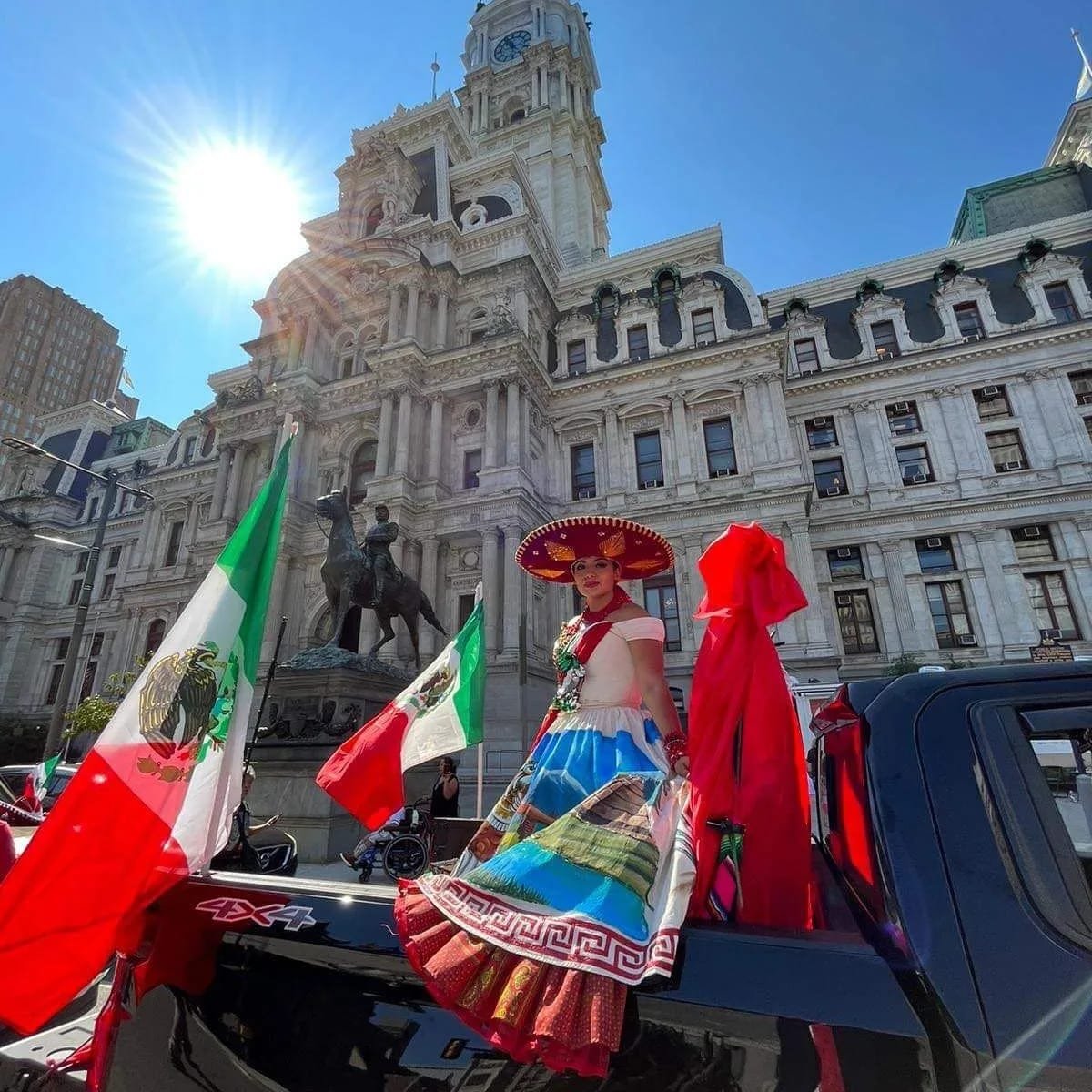
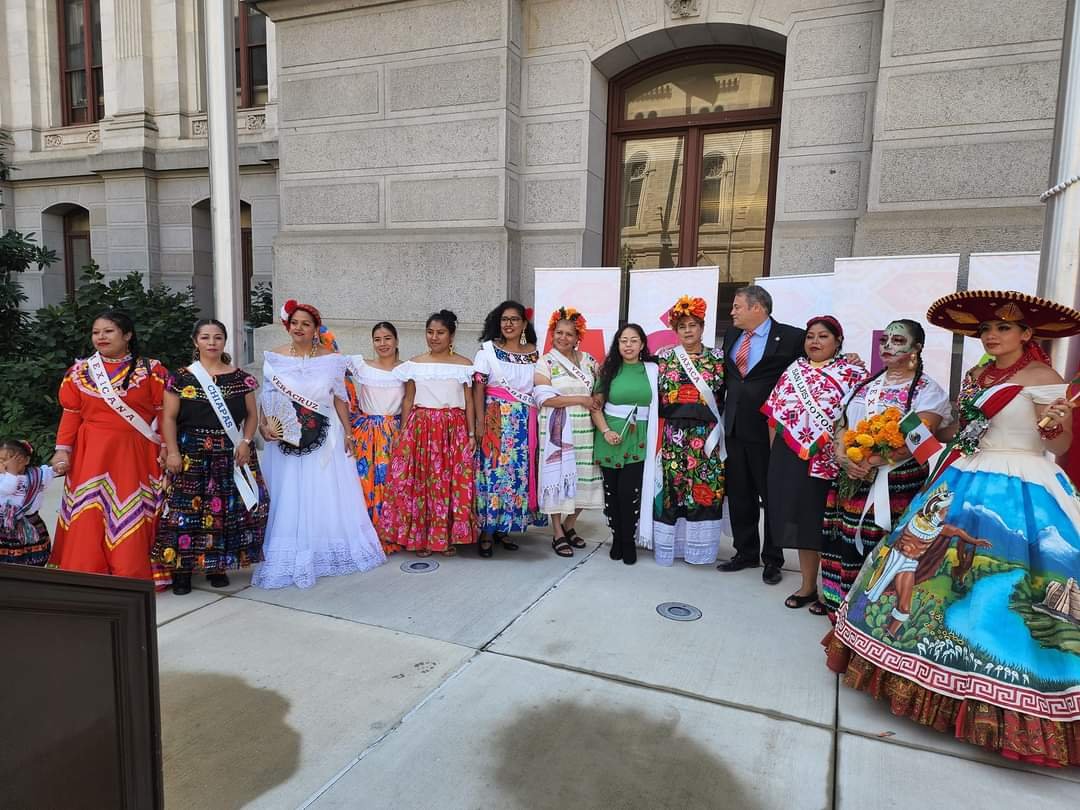
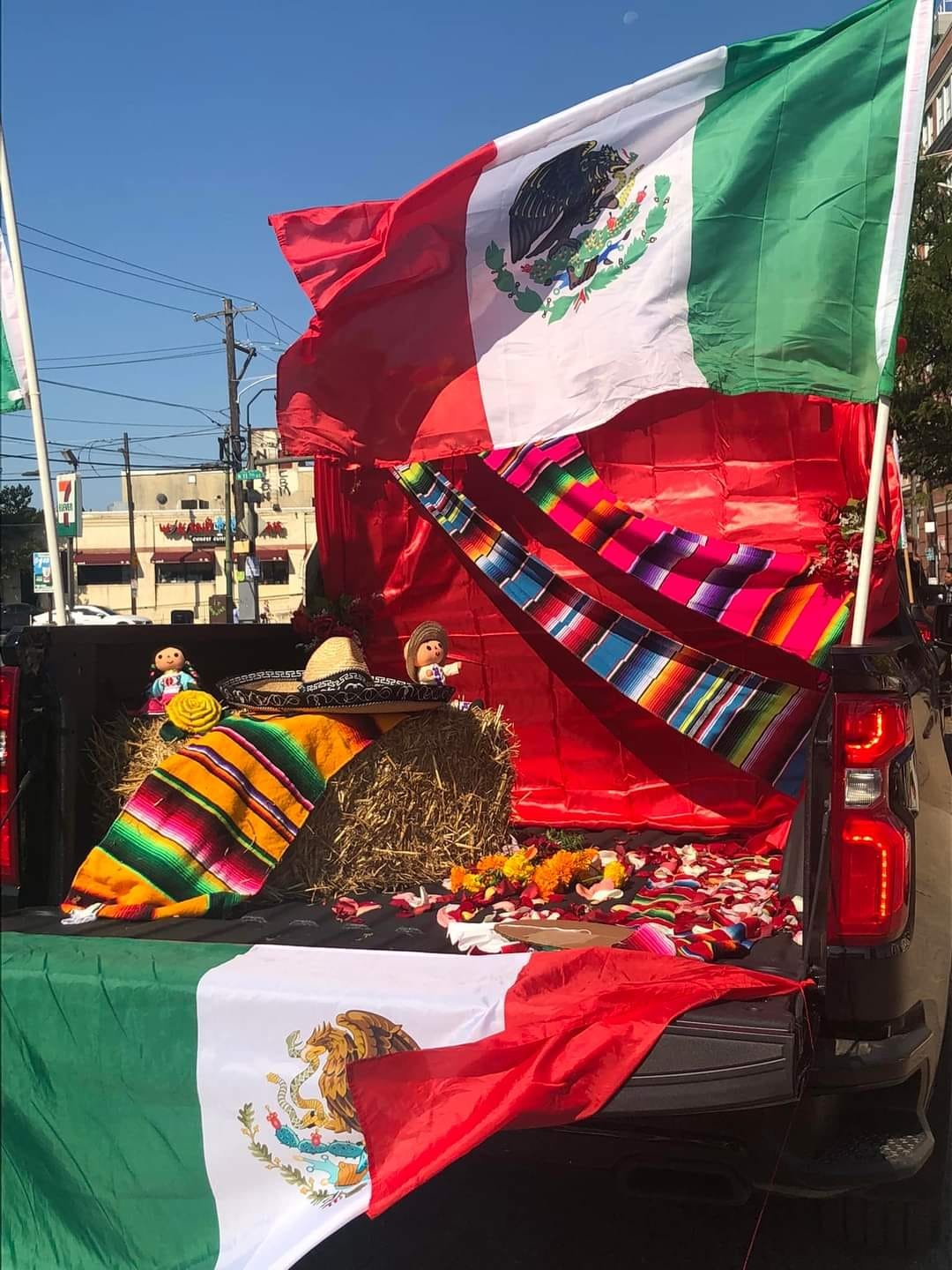
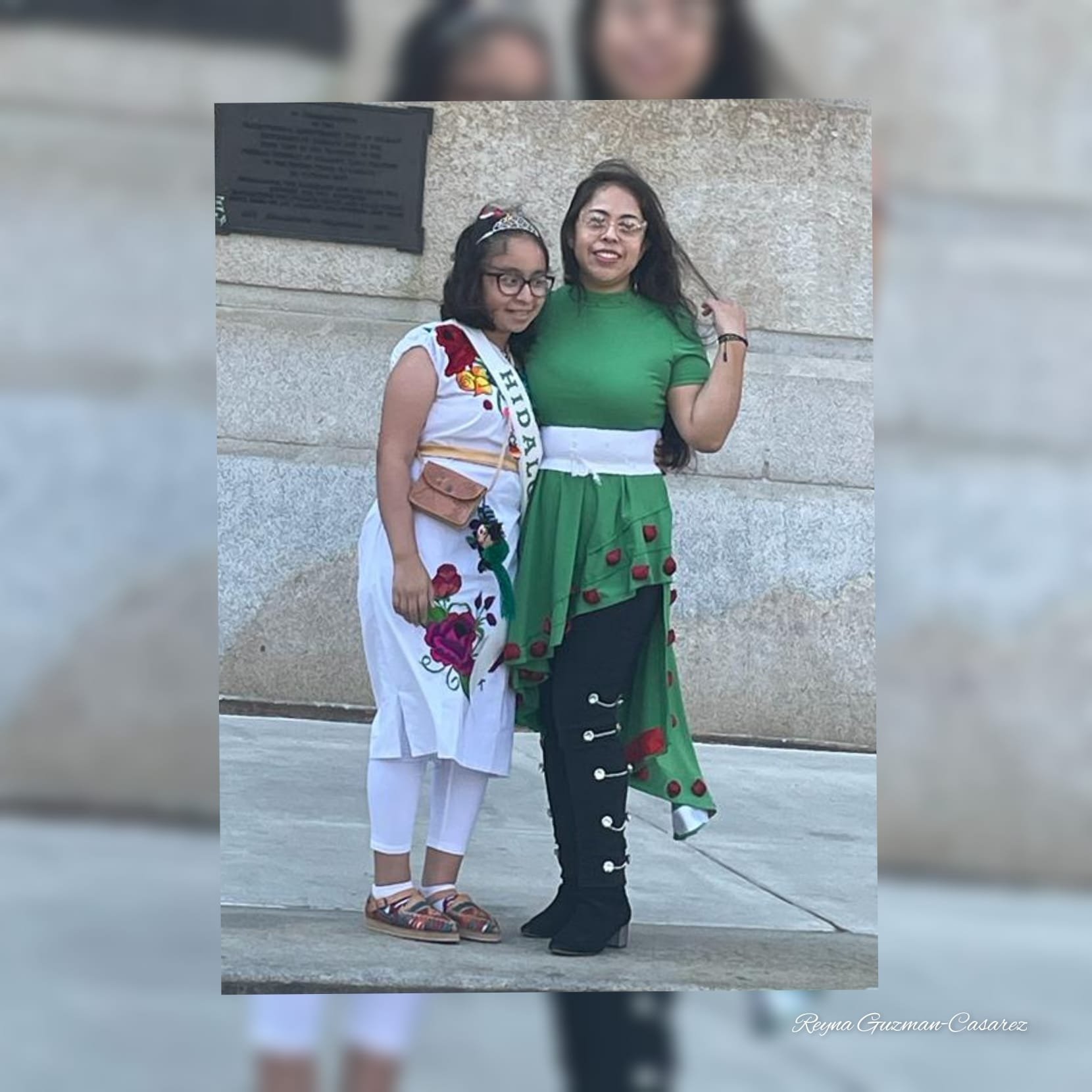
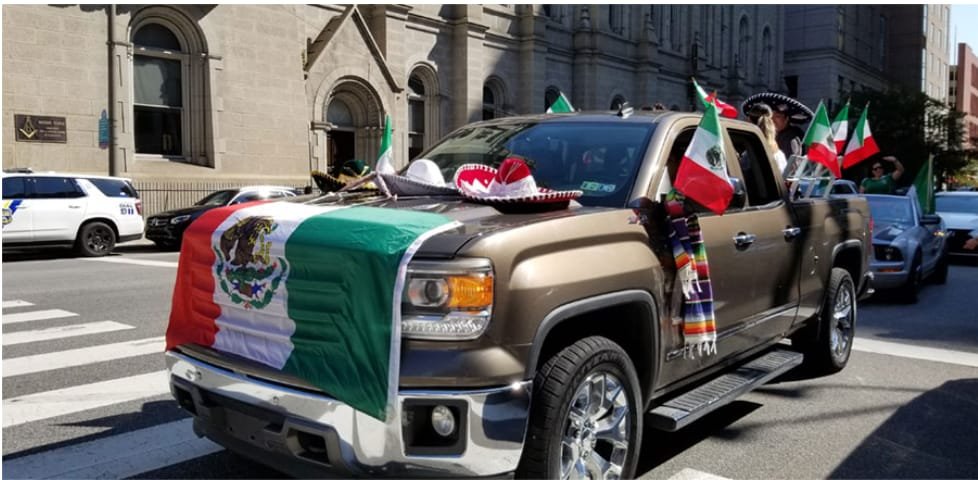
Engaging with community members and promoting a sense of unity
It was important for Guzmán Casarez that her community be reflected in the event, and one step towards that meant directly involving her community from the start.
That is how she was able to connect with Tomas “The Champion” Flores, founder of Champions Lowriders Club, who she met when he was first starting his club. This year, Flores is in charge of registering the vehicles that will be present at the parade. “When my children see that I was part of this parade and represented our country year after year, I think they will get that sense of urgency and passion to represent the country their parents emigrated from,” commented Flores.
Maribel Juarez and Reyna Guzmán Casarez working on crafts. (Courtesy of Reyna Casarez.)
For Flores and Guzmán Casarez, the connection to their country and community in the United States is very important. Guzmán Casarez commented, “The yearning for what we left behind, the traditions, the customs, the family… Many within the Mexican community did not have the opportunity to say goodbye to their parents, or their kids, and vice versa.” Guzmán Casarez knows the isolation that many immigrants feel due to being away from their birth country. This sentiment and her cultural identity is a big reason why she started the parade.
Guzmán Casarez added, “A person does not grow alone, especially in the US, we need to be shoulder to shoulder. This community is my family. This is my second home.”
The purpose of the parade is to, “feel united, to feel something special. All activity or memory that connects you with something that made you happy as a child can connect you with your kids and with your community, and is something that is helpful to mental health.” Guzmán Casarez is full of ideas and is always looking towards the future generations, while also keeping in mind the necessities of her community, especially for those who don’t have opportunities to celebrate their culture.
For Guzmán Casarez, the parade connects her to her country, her upbringing, and her Philadelphian Latine community. More than anything, she, like Flores, hopes the parade is the beginning of a tradition that the next generation can enjoy and look forward to. Guzmán Casarez emphasizes that, “There are people that have spent weeks working on this. This recognition is not for me, it is for my community. Come out and feel the emotion that you felt when you were in Mexico or in Central America, but also bring your children out so they can feel the same. They can say ‘there goes the parade,’ so your children will want to be part of it. That is where our cultural identity begins, when they can feel love and emotion for what is theirs, their roots.”















